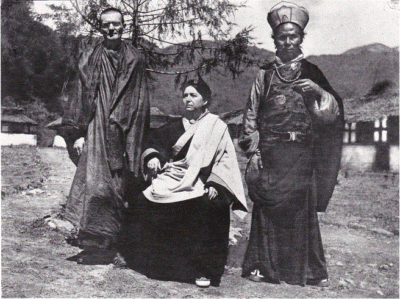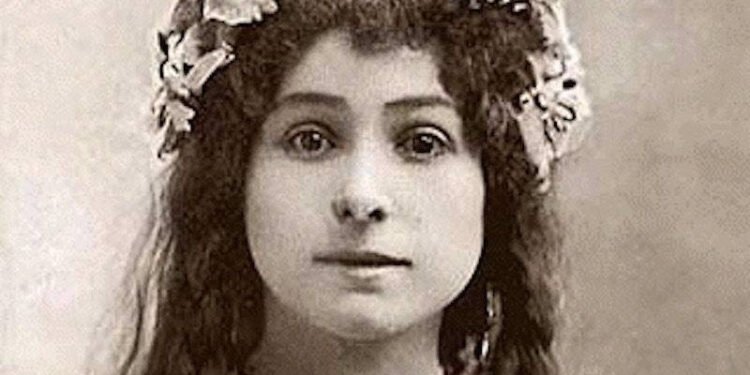Belgium, (Brussels Morning Newspaper) Alexandra, at age 100, chose to renew her passport. This fact speaks volumes about her life’s philosophy. From early on in her childhood to her dying day ( at age 101 yrs.!), this Belgian/French woman’s passions burned with a white-hot intensity. During her life, she was: a worldwide explorer, accomplished opera singer, spiritualist, practicing Buddhist Lama, political anarchist, feminist pioneer, and prolific writer. Such was the life and times of Alexandra David-Néel ( 1868-1969).
The first clue to this young girl’s fierce independence streak was that she continually ran away from home. Motivated not by any animosity towards her parents, but by an insatiable curiosity. By the age of 15yrs. she had become well-versed in various religions, geographies, and political philosophies drawn from her obsession with time spent in libraries and museums. By the age of 18, Alexandra had visited England, France, Switzerland, and Spain (on her bicycle!), and joined secret societies (e.g., Scottish Freemasons) while enthusiastically embracing various feminist and anarchist groups. As a young girl, she was passionate and independent with a curiosity that knew no bounds. These characteristics would only blossom exponentially as an adult.

Wanderlust, and then writing about it, was in Alexandra’s DNA. At age 23 she visited India for the first time and would adopt Buddhism as her “lamp of wisdom” (her words). She believed that the English language was an indispensable vehicle to spread the universal message of Buddhism. She moved to London to refine her linguistic skills in English and a year later, moved to Paris to study Sanskrit and Tibetan.
In 1893 Alexandra returned to her parent’s home in Ostend, Belgium, realizing that she needed a career to economically supplement her passions. She enrolled in the Conservatoire de Bruxelles where she studied voice and piano. From 1895-1904 she toured as a lead soprano performing in operas in Italy, Athens, Hanoi, and Tunis. The travel to these exotic places only fueled the passionate joy that was Alexandra David-Néel.
Alexandra’s visit to Tunis, Tunisia inspired her to delve deeper into the human experience of spirituality. Seduced by exotic Eastern thought and culture she traveled to India a second time to further her study of Buddhism. There she was a curious figure—a western woman, unaccompanied, independent with an infectious charisma. Alexandra was welcomed into royal palaces, befriended the Crown Prince, and was given access to many Buddhist monasteries throughout Northern India. She spent two years living in a hermitage cave at 3,600 meters practicing Tibetan yoga and meditation.
India’s neighbor to the north, Tibet— long considered the home for the practice of Buddhism— was, in 1915, amid their ongoing crisis with the invading Chinese. Its border was closed but Alexandra entered the country without permission. Here she would meet up with Tibet’s spiritual leader, the Pachen Lama, who he gave her the honorary title of Lama (advanced practitioner) and doctor of Buddhism.
In 1917 unable to return to Europe because of World War 1, Alexandra, accompanied by a colorful Tibetan monk, traveled east through China, Mongolia, Japan, and Korea to better acquaint themselves with Zen Buddhism. Often disguised as a monk or a servant, their journey was done on foot and took three years to complete. Upon her return to Tibet, she translated the 100,000-line Prajnaparamita —a manuscript of Buddhist wisdom.
Alexandra David-Néel would return to Europe in 1925 where she was surprised by the public recognition of her growing fame. News of her exotic travels was featured in newspaper headlines and on the covers of magazines. She wrote for journals, lectured on subjects (many controversial ) in cities across Europe, and advocated for the practice of Buddhism, Zionism, anarchy, and feminism. While in France and Belgium, she published her two most well-known books: My Journey to Lhasa (1927 and Magicians and Mystics in Tibet (1929).
Not content with simply reading, writing, and studying, Alexandra at age 69 years returned to Asia for what would eventuate into a nine-year sojourn. Traveling via Brussels, Moscow, the Trans-Siberian rail line, Mongolia, and Japan, she found herself in the middle of the horrors of the Second Sino-Japanese War—subjects she would elaborate upon in later writings. Time was spent in China and Northern India but this third visit to Asia has culminated in a five-year retreat in the mountains of Tibet.
At age 78, “tired and in rags” David-Neel returned to Europe to continue her prolific writing career. She would author 30 more books on Tibetan customs, Sanskrit and Tibetan grammar, Buddhist philosophy, anthologies of Eastern thought, erotic poems, political opinions, music, and her dialogues with the 3rd,4th, and 5th Dalai llamas. Her books would inspire the likes of Alan Watts, Jack Kerouac, Alan Ginsburg, and Ram Dass— Buddhist thinkers/writers all.
She died on September 8,1969 at age 101. According to her wishes, her ashes are scattered in the Ganges River.
To be sure, there have been many historical examples of women adventurers, women spiritualists, authors, and pioneers. Seldom though has any one individual —male or female–encompassed so many developed skills. Alexandra’s example was a life of continual learning, physical and spiritual development, displays of self-knowledge, and a vision for life as she followed her dreams. Is it any wonder she renewed her passport at the age of 100 years?




